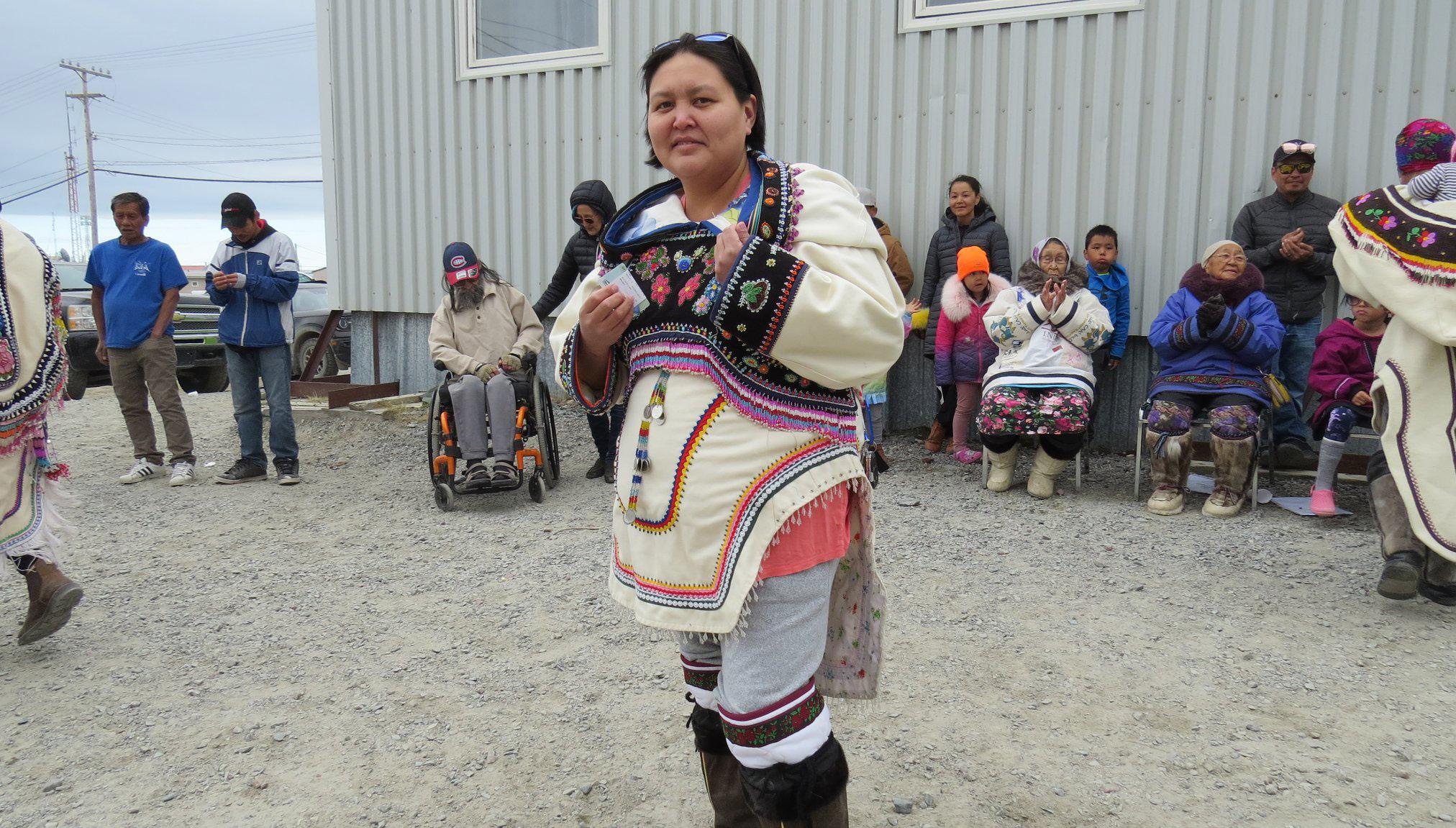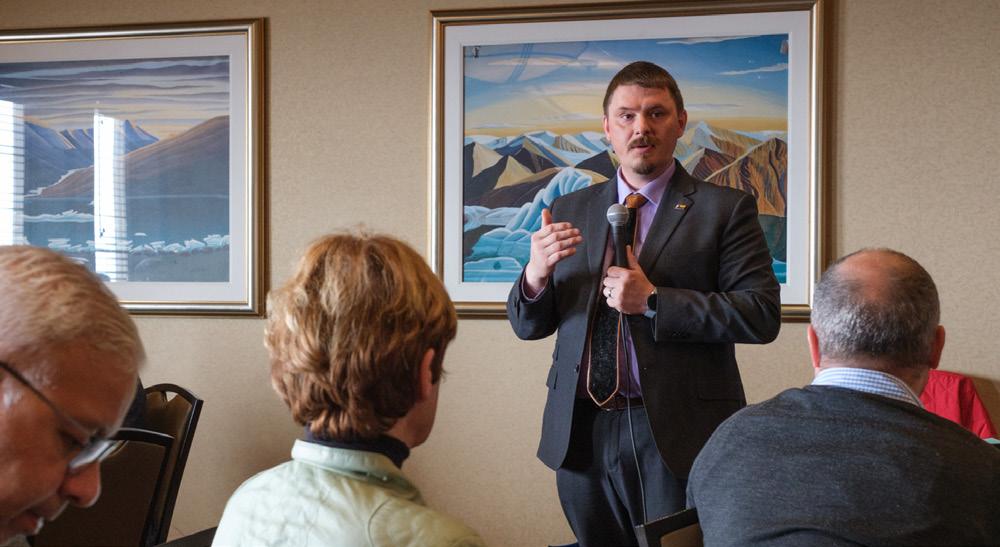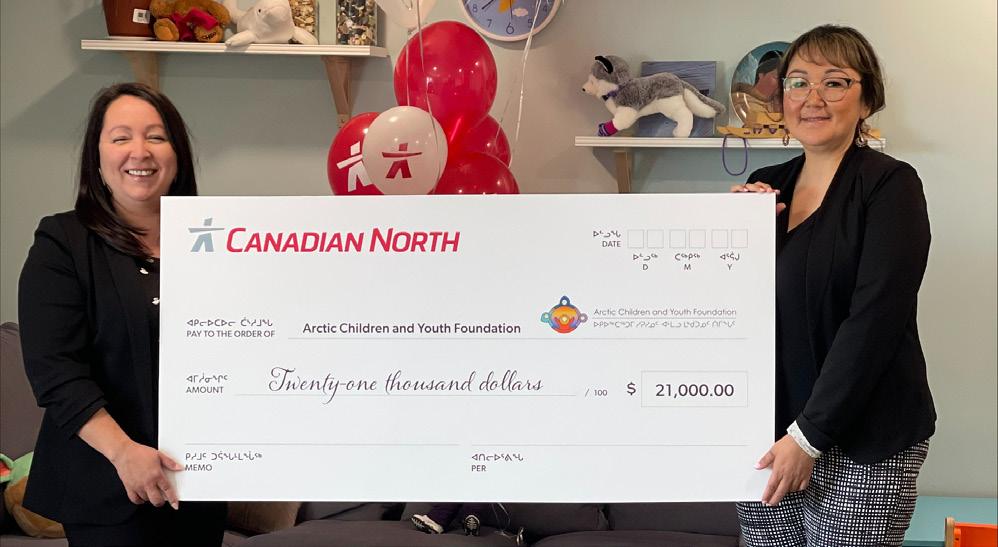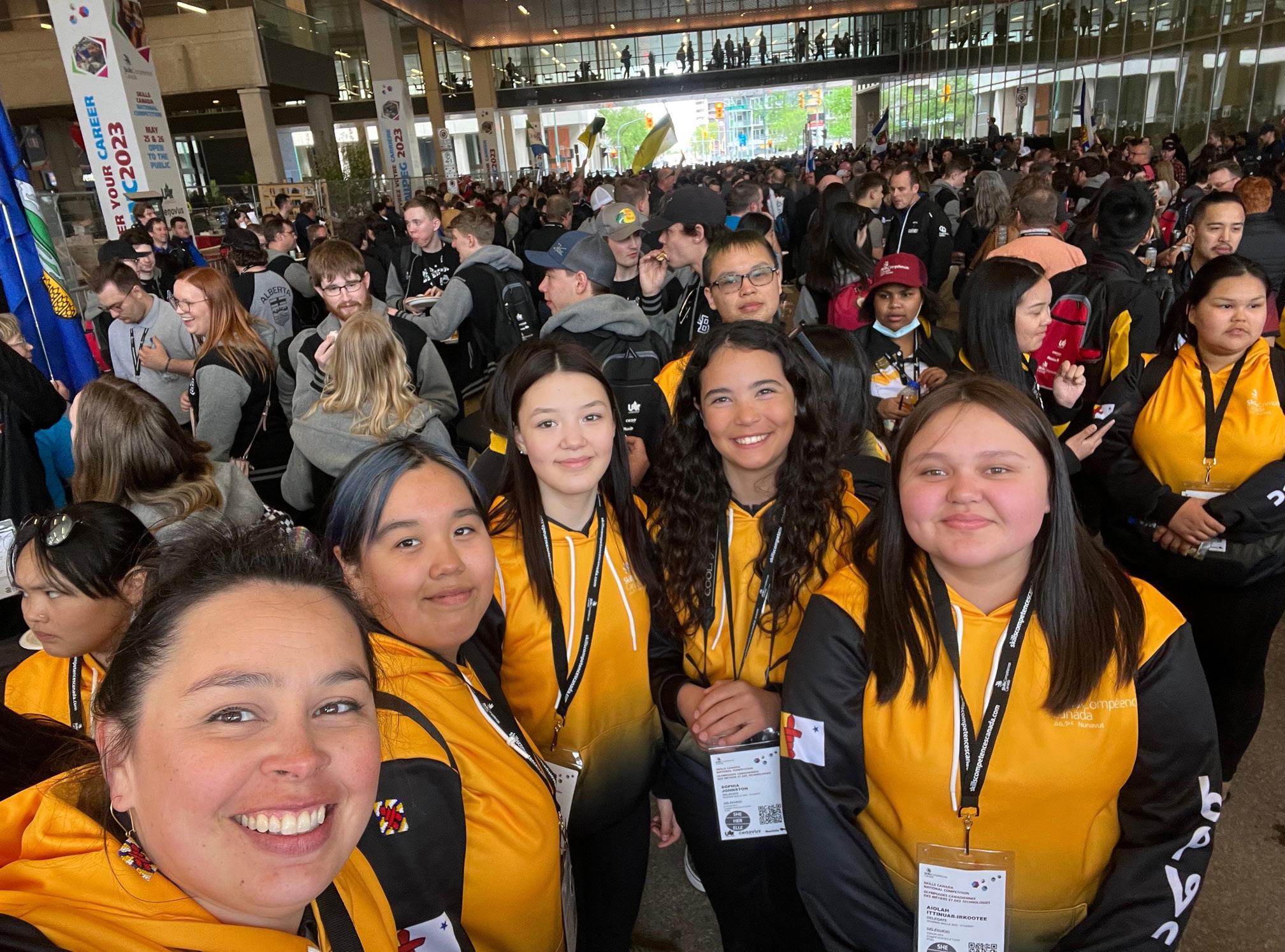
7 minute read
Support for Iqaluit Housing Authority employees on strike
We acknowledge the financial support of the Government of Canada.
Nous reconnaissons l'appui financier du gouvernement du Canada.
Member of the Ontario Press Council. The Ontario Press Council was created to defend freedom of the press on behalf of the public and press alike and to consider specific, unsatisfied complaints from readers about the conduct of the press in gathering and publishing news, opinion and advertising.
Complaints should go to:
The Ontario Press Council, 2 Carlton St., Suite 1706 Toronto, Ont., M5B 1J3
Email: Info@ontpress.com Fax: 1-416-340-8724 www.ontpress.com
SEND US YOUR COMMENTS
Email us at: editorial@nnsl.com; mail to Box 28, Iqaluit, NU, X0A 0H0; or drop your letter off at our office at 102 Tumiit Plaza. All letters submitted must be signed with a return address and daytime telephone number so that we can confirm it came from you.
Not all letters will necessarily be published.
Preference is given to short letters of broad interest or concern. Letters of more than 200 words, open letters and those published elsewhere are seldom used. We reserve the right to edit for length or taste and to eliminate inaccurate or libelous statements.
Dear editor,
I am writing to express my strong support for the employees of the Iqaluit Housing Authority (IHA) who have been on strike since March 17. The issues raised by the Nunavut Employees Union (NEU) on behalf of the IHA workers are of the utmost importance, and it is crucial that their concerns are heard and addressed.
It is disheartening to see that the NHC (Nunavut Housing Corporation) and the responsible Minister, Lorne Kusugak, have failed to take any responsibility for the current situation. While the NHC sets budgets, the IHA has consistently highlighted that the wage demands put forth by the NEU are beyond its financial capacity. This lack of acknowledgment and refusal to engage in meaningful dialogue only exacerbates the conflict and prolongs the strike.
The IHA’s refusal to offer fair wages and its insulting economic offers, which are well below the current inflation rates, are deeply concerning. The workers, a majority of whom are Inuit and their families, deserve to be compensated properly and provided with better working conditions. It is essential that the IHA recognizes the value of its employees’ hard work and dedication and takes immediate steps to address their valid wage concerns.
Furthermore, the IHA1s proposal to remove access to various articles in the collective agreement for casual and term employees is unacceptable. IHA wants to remove access to vital articles such as maternity allowance, severance and leave without pay for personal needs to name a few. The IHA has proposed removing any limitation on the use of term or casual employees, as well as eliminating any commitment to make term or casual employees permanent after a period of time in their position.
This move threatens job security and certainty for members, particularly Inuit staff. Instead of prioritizing the creation of fulltime, meaningful employment opportunities, especially for Inuit staff, the IHA seems to be disregarding their welfare and encouraging precarious casual work.
Another alarming aspect is the IHA’s discriminatory treatment of lnuktitut-speaking employees. By refusing to provide a language bonus to these employees, the IHA fails to acknowledge the clear advantage they bring to their work. lnuktitut-speaking employees who enter IHA homes play a vital role in ensuring effective communication and cultural sensitivity. It is only fair that they receive appropriate compensation for their valuable skills.
Moreover, the IHA’s reliance on scabs, replacement workers, and management during the strike instead of engaging in fair negotiations further exacerbates the situation. This approach shows a lack of commitment to resolving the conflict and reaching a fair deal. The introduction of federal anti-scab legislation would help prevent such situations and encourage genuine negotiations.
It is also worth noting that the IHA’s inability to retain quality employees and provide a proper workplace creates additional challenges for lqaluit’s most vulnerable residents. The IHA consistently faces understaffing issues, leading to stress and disorganization among the dedicated and caring staff who remain. The revolving door at the managerial level has contributed to the current state of chaos within the organization, which ultimately impacts the safety and well-being of the community.
Furthermore, the recent announcement by the NHC and NCC Development Limited {NCCD) regarding the construction of new public housing units raises concerns about the future of housing services in Nunavut. Without proper retention and recruitment strategies in place, it is uncertain who will be available to service and maintain these units. The stance taken by IHA workers has broader implications for housing services across Nunavut, underscoring the importance of addressing their concerns promptly.
I strongly urge the NHC, the responsible minister and the IHA to take immediate action to resolve the ongoing strike and address the legitimate concerns of the NEU members. Fair wages, job security, recognition of language skills, and better working conditions are essential to ensure a sustainable and effective housing authority.
Sara-Jayne Dempster President, Northern Territories Federation of Labour











Cheering for son’s aggressive nature takes mom by surprise
By Darrell Greer Notthern News Services
Hockey fanatic Ujaralaaq (Uja) Eno is a hockey mom times four with all of her boys — Shea Karetak, 13, Cael Karetak, 10, Tanner Karetak, 7, and Mitchell Karetak, 5 — loving the coolest game on ice almost as much as their mom does.
Eno was bursting with pride and happiness watching her oldest boy be awarded the junior high Male Athlete of the Year award at Maani Ulujuk Ilinniarvik (MUI) earlier this month.
Eno said it’s way different watching a game when it’s your sons on the ice.
She said now that her oldest boy is playing more competitive, full-contact hockey, there’s a lot more emotion involved while watching him play.
“OMG, sometimes I can’t even watch,” laughed Eno.
“When they played their first body-contact tournament in Winnipeg it was so hard for me, especially since he’s my first.
“But, at the same time, he’s so competitive, I wanted him to be aggressive because it was his first time and he was kind of hesitant.
“That was really surprising to me, but the hockey fan in me took over and, kind of, trumped the mom in me.”
Eno said she doesn’t know if she’d be able to watch if any of her boys had to play against each other somewhere down the line.
She said having two of them on different teams would be pretty intense.
“I’d say I find it most difficult watching Shea because of the body contact and the fact he’s so competitive and is the most compassionate of the four.
“I want him to be successful so much. It’s stressful as a mom.
“Shea started skating before he turned two. He was always watching his dad and he wanted to wear his skates in the house.
“He wanted to get on the ice right away. It was just natural for him.”
Eno said some young hockey moms just starting out don’t realize how demanding other aspects of the game can become.

She said the one piece of advice she offers the young moms is simply start saving your money.
“It’s not like soccer where you, basically, give them a pair of sneakers and send them on their way.
“It can be a little hard, at times, with the four of them playing. But, on the other hand, with all the travel our boys do up here, we don’t pay a lot extra because of all the fundraising everyone does to help. It’s pretty amazing, all the big-time help and support our young players receive from the community in general.
“The boys are also expected to do well academically and Shea did very well this year in that respect. He did well in both aspects, actually.
“I can’t imagine what they pay in the south. You even have to pay tryout fees there, let alone the extra fees you face if your son makes the travel team.”
Shea said he had no idea he was winning the award until he heard his name called at the school during the awards day ceremonies.
Shea, who plays both the wing and centre positions, sees himself a goal scorer like Auston Matthews. He said it was a big surprise hearing his name called for the award, which made him both happy and excited.
“I think one of the big reasons I won the award was being named captain of our soccer team at the Arctic Winter Games in Fort McMurray, Alta.


“Hockey is definitely my top sport, though. I really like skating, setting-up plays and scoring. This was my first year with body contact. I found it a little difficult at first because I was one of the smallest people out there. I got hit a lot, but I didn’t reallly mind it.
“I strengthened my game by improving my skating ability and learning to move the puck faster this past year. I plan on taking both those skills to the next level this coming year and really focus on becoming more of an overall team leader.” Hᐊᑭᒥ ᐊᓕᐊᓇᐃᒋᔭᓕᒃ ᐅᔭᕋᓚᒃ ᐃᓄ, ᑎᓴᒪᓂᒃ ᐃᕐᓂᓕᒃ - ᓯ ᖃᕆᑕᖅ, 13, ᑲᐃ ᖃᕆᑕᖅ, , ᕼᓄ ᖃᕆᑕᖅ, 7, ᐊᒪᓗ ᙵᑐ ᖃᕆᑕᖅ, ᑦ ᐊᓕᐊᓇᐃᒋᔭᓖᑦ Hᐊᑭᒥᑦ ᐊᓈᓴᖓᑎᑐᑦ. ᐃᓄ ᐱᑯᓇᕐᓂᕐᒥᒃ, ᖁᕕᐊᓱᖕᓂᕐᒥᒃ ᐊᑐᓚᐅᖅᐳᖅ ᑕᐅᑐᒃᖢᓂᐅᒃ ᐊᖓᔪᒃᖠᖅᐸᖅ ᐃᕐᓂᓂ ᓇᓗᓇᐃᑯᑎᖅᑕᐅᑎᓪᓗᒍ ᔪᓂᐊ ᐊᖑᑎᑦ ᑐᓂᕆᔭᐅᓂᖃᕐᓂᖅ ᐊᕋᒍᒧᑦ ᒪᓂ ᐅᓗᔪᖅ ᐃᓕᓂᐊᕐᕕᖕᒥ. (mui) ᑕᕿᑦᑎᓐᓂᓴᖅ. ᐃᓄ ᐅᖃᖅᐳᖅ ᐊᓯᐊᓂᒃ ᐃᒃᐱᒍᓱᖕᓇᖅᐳᖅ ᕿᑐᖓ ᑕᐅᑐᒃᖢᒍ ᓯᑯᒥᑦ. ᐃᕐᓂᖓ ᐊᒃᓱᕈᕐᓂᖅᓴᐅᓕᕋᒥ, ᖃᓄᑐᐃᓐᓇᖅ ᐃᒃᐱᓂᐊᓐᓇᕆᕙ. ‘ᐅᐊᑲᓪᓚᖓ ᐃᓚᓐᓂᒃᑯᑦ ᖁᖏᐊᖃᑕᕈᓐᓇᖏᒻᒪᕆᒃᑐᖓ.’ ᐃᓚᓯᕗᖅ ᐃᓄ. ᐱᖑᐊᕆᐊᖅᖢᑎᒃ ᑎᒥᖏᑎᒍᑦ ᐊᒃᓱᕈᒃᑲᓐᓂᖅᖢᑎᒃ ᐅᐃᓂᐱᒃᒥ ᐊᔪᕐᓇᓚᐅᖅᑐᖅ ᐅᕙᓐᓄᑦ, ᓱᖃᐃᒻᒪ ᓯᕗᓪᓕᖅᐸᕆᖕᒪᔾᔪᒃ, ᐊᒃᓱᕈᕈᒪᓂᖃᓚᐅᖅᖢᓂᓗ. ᐅᕙᓗᓂᑦ ᑲᒪᓇᓚᐅᖅᑐᖅ, ᑭᓯᐊᓂ ᐊᓕᐊᓇᐃᒋᔭᖃᕐᖢᓂ Hᐊᑭᒥᒃ ᐅᐃᒪᔭᖃᑕᐅᓇᖅᐳᖓ. ᑕᑯᔪᓇᕋᔭᖁᖏᑕᒃᑲ ᐱᖑᐊᖃᑎᒋᒋᐊᖃᓯᑲᓚᖕᓂᖅᐸᑕ ᐃᕐᓂᑲ ᐊᑭᕋᕆᕐᓗᑎᒃ. ᐊᑭᕋᕆᕋᔭᖅᐸᑕ ᐅᐊᑲᓪᓚᖓᖑᓇᔭᖅᐳᖅ. ᐅᖃᕋᔭᖅᐳᖓ ᓯ ᐱᖑᐊᖅᑐᖅ ᑕᐅᑐᒋᐊᒃᓴᖅ, ᐊᒃᓱᕈᒃᑲᐅᓗᐊᕐᓂᖓᓄᑦ ᐃᓴᒍᓱᖃᖏᓪᖢᓂ, ᐃᓴᒍᓱᖃᖏᓛᖑᓪᓗᓂᓗ ᐃᕐᓂᖏᓐᓂᒃ. ᐊᓇᓇᐅᓪᓗᓂ, ᐊᔪᖏᖁᓗᐊᒧᑦ ᑕᖃᓇᒻᒪᕆᓱᖅ ᐃᓱᒪᒧᑦ. ᓯ ᓯᐊᕆᔭᖃᑕᓕᓚᐅᖅᓯᒪᕗᖅ ᐊᕋᖓ 2ᓂᒃ, ᐊᑕᑕᓂ ᑕᐅᑐᒍᓚᐅᖅᐸ, ᓯᐊᕆᔭᐅᑎᓂᒡᓗ ᐊᑐᕈᒪᐃᓇᐅᔭᓚᐅᖅᐳᖅ ᐃᒡᓗ ᐃᓗᐊᓂ. ᓯᑯᒥᐅᑕᓴᔭᐅᑲᐅᑎᒋᓚᐅᖅᑐᖅ, ᐃᓕᖁᓯᕆᓪᓗᓂᐅᒃ ᓱᕐᓗ. ᐃᓄ ᐅᖃᖅᐳᖅ Hᐊᑭᖅᑎᖑᓕᓵᖅᑐᓄᑦ ᐊᓇᓇᐅᔪᑦ ᐅᔨᕈᓱᖏᑦᑐᑦ ᑭᓇᐅᔭᖅᑐᖅᓴᕐᓂᖓᓄᑦ. ᐅᖃᕈᓐᓇᑐᐃᓇᖅᐳᖅ ᑭᓇᐅᔭᓂᒃ ᑲᑎᑎᔭᕆᐊᖃᕐᓂᖏᓐᓄᑦ. ᐊᕿᔭᑐᖅᓯᐅᑎᓂᒃᐃᓯᒡᐅᔭᖅᑖᖅᑐᖅᑎᑐᑦ ᐱᖏᒻᒪᑦ, ᐊᐅᓪᓚᖅᑎᓕᕐᓗᒋᓪᓗ. ᐊᔪᕐᓇᓚᐅᑲᓱᖅ, ᑕᒪᕐᒥᒃ ᑎᓴᒪᑦ ᐱᖑᐊᖅᐸᒃᑎᓪᓗᒋᑦ ᑭᓯᐊᓂ ᑎᒥᒃᑯᑦ ᐊᐅᓚᑦᑕᖅᑕᖏᑦ ᑭᓇᐅᔭᒃᑯᑦ ᑲᑎᑦᑎᓂᒃᑯᑦ ᑲᒪᒋᕙᒃᐸᕗᑦ, ᐃᑲᔪᖅᑕᐅᓪᓗᖓ ᓄᓇᖃᑎᓐᓂᑦ. ᐱᑯᓇᖅᑐᒻᒪᕆᐊᓗᒃ ᑕᑯᓪᓗᓂ ᓄᓇᖃᑎᑦᑎᓐᓂ ᐊᑲᔪᖅᑐᖅᑕᐅᔪᑦ ᐱᖑᐊᖅᑎᑦ. ᖁᕙᓯᖕᓂᖅᓴᒧᑦ ᐱᓂᐊᕋᓱᒋᔭᒃᑲ, ᓯ ᐱᖑᐊᑦᑎᐊᓚᐅᕐᓂᖓᓄᑦ. ᑕᐅᑐᖑᐊᕈᓐᓇᖏᑉᐳᖓ ᖃᓱᑐᕋᔭᕐᒪᖓᑦ ᖃᓗᓇ ᓄᓇᓄᑦ ᐃᖑᐊᕆᐊᖅᐸᑕ. ᓯ ᖃᐅᔨᒪᓚᐅᖏᑦᑐᖅ ᓇᓗᓇᐃᑯᑕᕐᒥᒃ ᑐᓂᕆᔭᐅᓂᐊᕐᓂᖓᓂᒃ ᑭᓯᐊᓂ ᐃᓕᓂᐊᕐᕕᒥᑦ ᐊᑎᓂ ᑕᐃᔭᐅᖕᒪᑦ ᐃᓕᓴᕆᔭᐅᓂᖃᖅᑎᓪᓗᒋᑦ. ᓯ ᐱᖑᐊᓱᖅ ᑐᓄᑎᐊᖓᓂᑦ ᐊᒪᓗ ᕿᑎᐊᓂ ᑕᑯᕗᖅ ᓇᖕᒥᓂᖅ ᐱᒃᑲᐅᓂᖓᓂᒃ ᐊᔅᑎᓐ ᒪᑎᐅᑐᑦ. ᖁᒃᓴᓪᓚᓚᐅᖅᐳᖅ ᐊᑎᓂ ᑕᐃᔭᐅᖕᒪᑦ, ᐊᓕᐊᓇᐃᒍᓱᑦᑎᐊᖅᖢᓂᓗ. ᓵᓚᒃᓴᕈᑎᒋᖅᖁᕐᒥᔭᕋ
ᐊᑦᑎᖅᑕᐅᓚᐅᖅᓯᒪᒐᒪ ᐊᕿᔭᕐᓂᕐᒧᑦ ᑲᑉᑎᓐᒥᒃ, ᕗᐊᑦ ᒥᒧᕆᔭ. Hᐊᑭ ᐱᖑᐊᕐᓂᖅ ᖁᑎᓚᖑᕗᖅ, ᓯᐊᕆᔭᕈᒪᐅᒐᒥ, ᐱᖑᐊᕆᐅᖅᓴᕋᒃᑯ ᑎᒥᒃᑯᑦ

ᐊᒪᑕ ᐃᔨᑎᐊᖅ ᐃᓕᓴᖅᓯᓂᖃᖅᐳᖅ ᓯ ᕿᕆᑕᕐᒥ, ᓴᐅᒥᖕᒦᑦᑐᖅ, Hᐊᑭᖅᑎᕋᓚ ᐊᖑᑎᓄᑦ ᐱᑲᐅᓚᖅ ᐊᕋᒍᔪᒥ, ᒪᓂ ᐅᓗᔪᖅ ᐃᓕᓐᓂᐊᕐᕕᒃ ᑲᑭᖅᖠᓂᕐᓂ ᑕᕿᐅᓴᖅᑐᒥ. ᐊᔨᓕᐅᕆᔨ ᐅᔭᕋᓛᖅ ᐃᓄ
ᐊᒃᓱᕈᕐᓂᖅ, ᐊᔪᕈᓐᓂᕆᕈᓴᖅᑐᖅ ᒥᑭᓚᖑᖃᑕᐅᖕᒪᑦ ᐱᖑᐊᖅᑎᓂᒃ. ᖃᓄᐃᒋᖏᖢᓂᐅᒡᓗ. ᑐᓗᖅᑕᐅᖃᑦᑕᖅᖢᖓ, ᖃᓄᐃᖏᒃᑭᓪᓗᓂ. ᐊᔪᕈᓐᓂᖅᐸᓕᐊᓴᖅᑐᖓ ᓯᐊᕆᔭᕐᓂᕐᒥᒃ, ᐸᒃᓗ ᐊᐅᓚᔾᔭᒃᑎᑲᐅᑐᕈᓐᓇᕐᓂᕐᒥᒃ, ᐊᕋᒍᔪᒥ ᖁᕙᓯᖕᓂᖅᓴᒧᕈᒪᕗᖓ, ᑐᑭᒧᐊᖅᑎᑦᑎᓂᖅᓴᐅᓗᖓᓗ.








